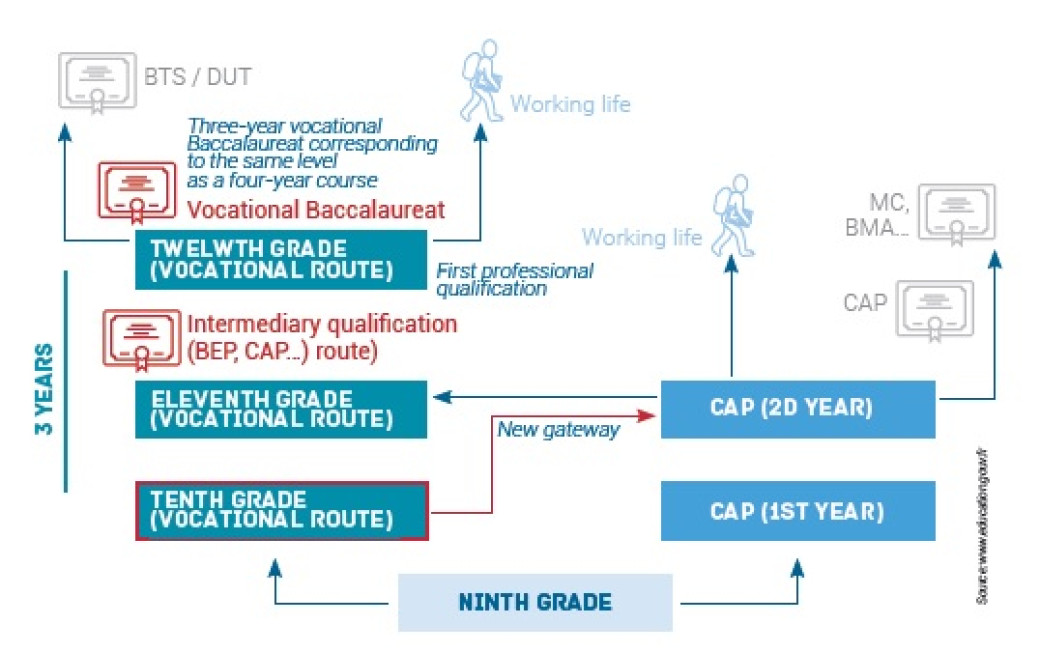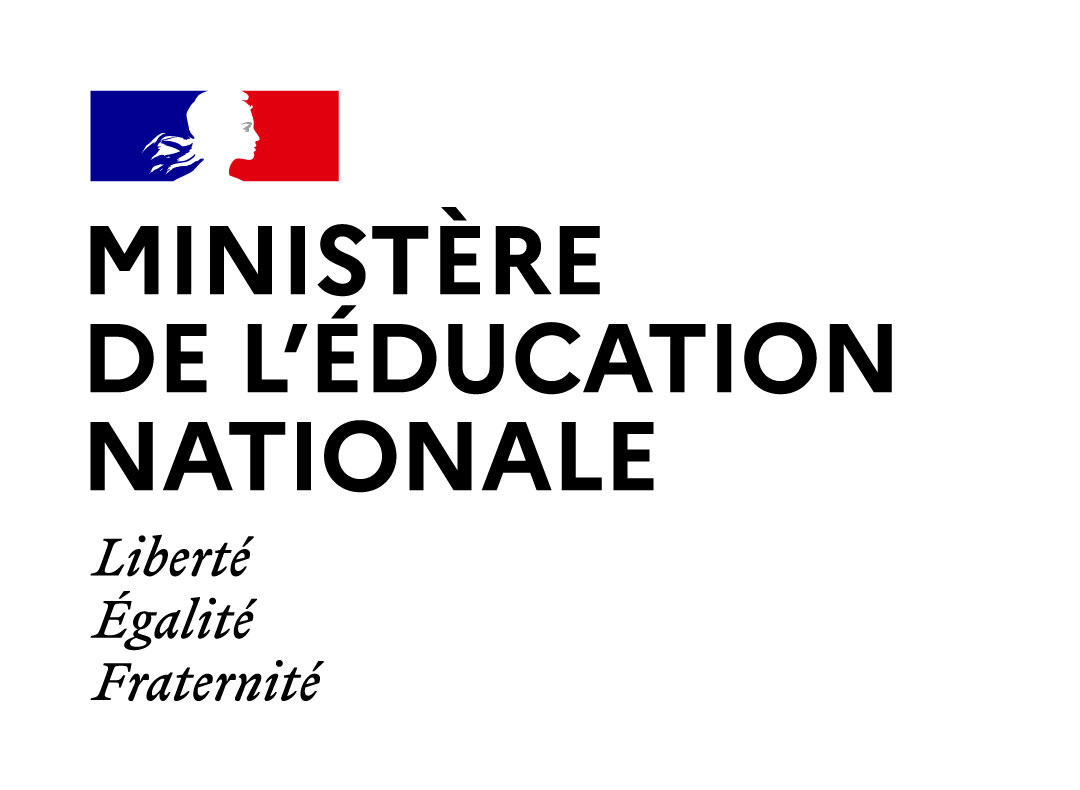
Upper Secondary School: le Lycée
After successful completion of lower secondary school, pupils advance to upper secondary school where they complete three years: seconde, première, and terminale. A general education is provided to all students during the seconde level, after which they choose more specific routes in première which will lead to their baccalaureate exam at the end of terminale. Students have the choice between three potential schooling routes: general, technological, and vocational.
Mis à jour : juin 2023
Seconde (first year of secondary school)
“Second year” is designed to enable students to consolidate and expand their understanding of a core foundation of learning, skills and knowledge in order to ensure a successful transition from secondary school (collège) to high school (lycée). This year aims to prepare students to make their choice for the final stage of their secondary education, opting for either a general or technological baccalaureate, with the objective of pursuing successful further education and eventual careers.
It combines:
- core classes designed to strengthen shared, communal knowledge;
- optional classes: students may choose no more than two optional classes - one general optional class and one technological option class.
A more targeted Second year program also remains in place: the “Science and Technology of Hotel and Restaurant Management” (French: STHR), which leads into the baccalaureate program of the same name.
Times and schedules for core classes are the same for everyone. They total 26.5 hours in the following subjects: French, History-Geography, modern languages A and B, social and economic sciences, mathematics, Physics/Chemistry, Life & Earth Sciences, physical education, Civic and Moral education; digital sciences and technology.
In addition to core subjects, students may choose up to two optional subjects. These classes have various objectives: helping students to explore emerging disciplines (knowledge and methods); allowing them to identify what kind of career options these subjects might lead to; preparing them to pick a specialty or a program for the next year and providing them with information on the relevant higher education sectors.
Examples of optional classes include: scientific and technological subjects (engineering, laboratory sciences, etc.); literary subjects (Classics, ancient languages and cultures, a third modern language); artistic subjects (plastic arts, music, performing arts, etc.).
In General Secondary and Technological Secondary, as well as in First year and Final year, in addition to personalised support based on the need of each student, an orientation support program of 54 hours (intended as a guide only) is offered to students to help them prepare their future choices for the pursuit of higher education.
Première and terminale: the last two years of upper secondary school
General
Classes in the final year are made up of core classes taken by all students and speciality subjects chosen by each student.
These core classes include French (in first year), philosophy (in final year), history-geography, modern languages A and B, science, civic and moral education and physical education. In total, core classes represent almost 60% of total teaching time in first year and 55% in final year.
In addition to these core classes, students also take their speciality subjects: three in first year and two in final year. These classes enable students to gradually acquire the specific skills and knowledge they will need in order to pursue their chosen path in higher education. In first year, 12 specialities are available. In final year, students opt to retain 2 speciality subjects from 3 first year options, based on their personal areas of interest and their plans for further study.
Optional classes (choice of 1 in first year and up to 2 in final year) enable students to supplement their education based on their areas of interest and their plans for further study. Optional classes for final year (“Additional Mathematics”, “Expert Mathematics” and “Law and Modern World Issues”) allow students to expand their options for higher education.
Technological
The goal of the technological route of upper secondary school is to prepare students for advanced technological studies in the science and technology fields. Courses students take while in upper secondary school can be further extended through a bachelor's or professional degree at the university level, or lead directly into integration in the professional field. Similar to the general bac route, there are several series within the technological route that students can choose to follow such as:
- Science and Technology in Industry and Sustainable Development (STI2D)
- Laboratory Science and Technology (STL)
- Management sciences and technologies (STMG)
- Health and social sciences and technologies (ST2S)
- Science and technology of design and applied arts
- Hospitality and Catering sciences and technologies (STHR)
- Music and Dance (TMD)
- Agronomy and living sciences and technologies (STAV). This training is taught in secondary schools under the Ministry of Agriculture
Students are also given the choice of two optional courses of art or physical education and sports, to be taken alongside their technological classes if they so choose. Also similar to the general route, some courses are subjected to an advanced test at the baccalauréat: French and history and geography (series STI2D, STL, STD2A).
All students following the technological program take core classes, the times and teaching schedules of which are identical for all. They total 14 hours in first year and 13 hours in final year in the following disciplines: French in first year and philosophy in final year; history-geography, moral and civic education; modern languages A and B, technology in modern language A, physical education, mathematics.
Students may also opt to take optional classes.
In each curriculum, students also take three speciality subjects in first year and two in final year. These classes are specific to each curriculum.
Vocational
There is a third route which allows pupils to gain vocational skills as well as general knowledge specific to a given field. This track was reformed in 2009 to help raise the qualifications of young people, improve their transition from school to a professional environment, and facilitate further study in higher education when relevant.
In the lycée professionnel, pupils attend seconde to prepare for a baccalauréat professionnel over three years or a first year leading to the certificat d'aptitude professionnelle (CAP) over two years.
Part of this course occurs in the work place where students gain hands-on experience and skills, which are defined by the framework of each diploma and assessed through exams. At the end of upper secondary, pupils sit for the vocational baccalaureate exam, similar to general and technological, which gives level IV end of secondary school certification (see French Classification inset).
A level V intermediary qualification (CAP or BEP) is taken at some point during the course of the three year period of study to ensure that each young person gains some qualifications.
Young people can also work towards their vocational diploma through an apprenticeship at a Centre de Formation d'Apprentis (CFA) (Apprentice Training Centres) and day release to an employer. They have the status of young private sector employee and report to a head tutor, or can choose to work in the public sector.
To provide full support for students, new pedagogical initiatives are being put in place:
- co-teaching by teachers from the general curriculum and vocational curriculum is being expanded. The objective is to give greater purpose to general subjects by making them more practical for students in a professional perspective;
- throughout their studies at a vocational high school, the student will prepare (individually or collectively) a project known as their “Masterwork” that they will present to a jury at the end of their final year;
- every high school student benefits from more time dedicated to consolidation, support and preparing their future plans (265 hours in the vocational baccalaureate and 192.5 hours in vocational qualification over the course of the cycle).
Qualifications:
- Certificate of professional aptitude (CAP): level V, 2 years of study, over 200 specialisms;
- Le baccalauréat professionnel (vocational baccalaureat): level IV, 3 years of study, 70 specialisms;
- Le brevet professionnel (BP ): level IV, (only through apprenticeship) 2 years of training after a CAP, 68 specialisms;
- La mention complémentaire (MC: optional qualification): level V or IV, one year after the CAP or baccalauréat professionnel, 57 specialisms;
- Le brevet des métiers d'art (BMA: arts vocational qualification): level IV, 2 years after a CAP in the vocational arts, 26 specialisms.

A vocational degree can also be prepared within the framework of an apprenticeship that alternates classroom work in an apprentice training center (CFA) and experience in a company. The apprentices have then the status of young worker and are under the responsability of a supervisor. They can also be welcomed into public service.
For more information about vocational training and its impact in France, click here.
French classification of the different levels of training
| French Classification | Level of training | International classification (ISCED*) | European qualifications framework (EQF) |
|---|---|---|---|
| Level VI | No education beyond the end of compulsory schooling | 0 | - |
| Level V bis | Short training lasting a maximum of one year (leaving prior to the final year of the second short cycle) | 2 | - |
| Level V | Education equivalent to BEP or CAP | 3c | 3 |
| Level IV | Qualification equivalent to the baccalauréat or brevet professionnel | 3 | 4 |
| Level III | BTS, DUT level or end of first cycle of higher education | 5b | 5 |
| Level II and I | Level of comparable with or above that of 2nd cycle of higher education | 6 |
7 and 8 |
*ISCED: UNESCO's 'International Standard of Classification of UNESCO,
used for inter-country comparisons (classification according to the diploma obtained)


